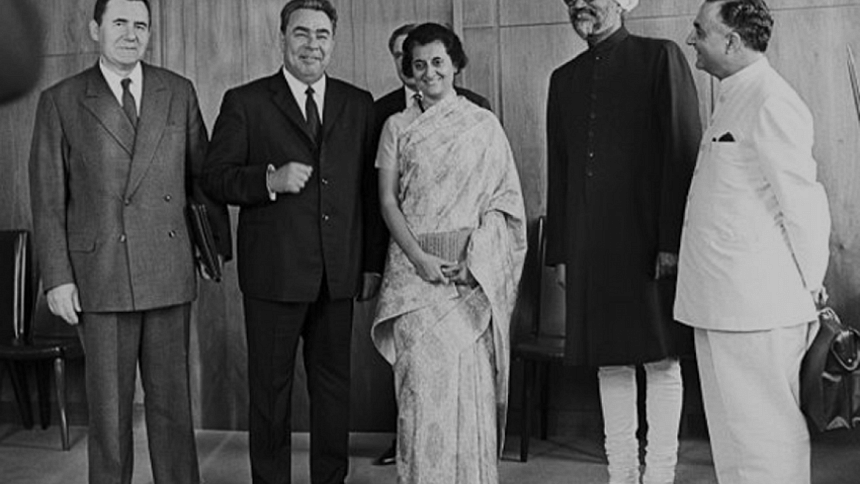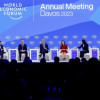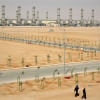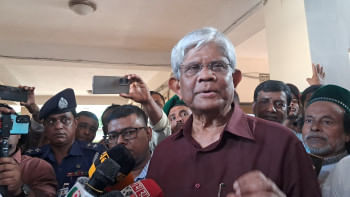Russian invasion of Ukraine: Understanding Bangladesh’s position

In international relations, there are no permanent friends or permanent foes, but only permanent interests, say the apostles of pragmatism. But that theory would fail to explain the friendship Bangladesh had with the Soviet Union. Based on a diplomatic narrative of our "Muktijuddho" in 1971 and the thoughtful evolution of sovereignty and territorial integrity of state, Bangabandhu's daughter Sheikh Hasina has walked a diplomatic tightrope over Ukraine. Looking back in time will give some clues on how Russia's (former Union of Soviet Socialist Republics) diplomatic responses to the 1971 war ensured the entry of an independent Bangladesh into the UN, providing an international framework for the new country's orientation and aspirations. Bangladesh's abstention from voting on a resolution on March 2, 2022 is not a diplomatic dilemma at all, rather it's the upholding conscience of our "Muktijuddho".
International diplomacy before the outbreak of the 1971 war was limited to upholding democracy in Pakistan. The outcome of the December 1970 parliamentary elections in Pakistan, which had resulted in the victory of Bangabandhu Sheikh Mujibur Rahman's Awami League party in the legislature of united Pakistan, with 167 of the 313 seats, was rejected by Pakistan's military ruler General Yahya Khan. Instead, with the launch of "Operation Searchlight" on March 25, 1971, Pakistan unleashed a reign of terror and genocide. Then the Soviet President Nikolai Podgorny first wrote to President Yahya Khan on April 2, 1971 denouncing "Operation Searchlight" and calling for a "peaceful settlement" in East Pakistan. Alongside other countries, British PM Edward Heath wrote to President Yahya Khan on November 9 suggesting a negotiated settlement in East Pakistan with the Awami League. Also, French President Georges Pompidou wrote a letter on November 18, 1971 to President Yahya Khan asking him to release Sheikh Mujib as part of a political settlement in East Pakistan.
In defence diplomacy during the war in 1971, the former Soviet Union co-formatted with India and implemented the inter-state security policy, and its task was to create stable, long-term international relations with Bangladesh. The Soviet Union vetoed UN resolutions to intervene in Bangladesh's war of independence at least twice. India's Foreign Minister Sardar Swaran Singh visited Moscow in June 1971 to discuss and negotiate the Indo-Soviet Treaty of Peace, Friendship and Cooperation as both countries were convinced that in the world of today, international problems can only be solved by cooperation and not by conflict, reaffirming their determination to abide by the purposes and principles of the United Nations Charter. Finally, the Treaty of Peace, Friendship and Cooperation was signed on August 9, 1971 during Soviet Foreign Minister Andrei Gromyko's visit to New Delhi.
This treaty immensely contributed to a modern era of international defence diplomacy, allowing India to successfully meet one of the greatest security challenges it has faced. The Pakistani army's genocide in Bangladesh led to a grave security situation for India as refugees began to cross the border, and it became evident that the Western powers had no real sympathy for Bangladesh's predicament and their major objective was the maintenance of Pakistan's territorial integrity. Henry Kissinger's dramatic and secret visit to China from Pakistan in July 1971 led him to overlook the Pakistan army's genocide and encouraged China to take military action, should India militarily intervene in Pakistan. In this situation, India simply had to possess the cover of a security assurance from the Soviet Union. This was provided by Article IX of the treaty, which stated, inter alia, "In the event of either Party being subjected to an attack or a threat thereof, the High Contracting Parties shall immediately enter into mutual consultations to remove such threat and to take appropriate effective measures to ensure peace and security of their countries."
On December 3, 1971, Pakistan Air Force launched a series of air raids on Indian air bases under the operation code named Operation Chengiz Khan. On 5 December, United States began attempts for an UN-sponsored ceasefire, which were twice vetoed by the Soviet Union in the security council. However, India extended her recognition of Bangladesh on December 6. In such circumstances, the United States dispatched a 10-ship naval task force, the US Task Force 74, from the Seventh Fleet off of South Vietnam into the Bay of Bengal. The Enterprise weighing 75,000 tonnes was the largest nuclear-powered carrier in the world with 70 fighter aircraft. The task force was to be headed by USS Enterprise, at the time and still the largest aircraft carrier in the world. At the same time, UK dispatched its aircraft carrier HMS Eagle in the Arabian Sea. With the US in the Bay of Bengal, the UK in the Arabian Sea, and Pakistan on land, India was in a difficult spot. The US and UK hoped that China would also attack India.
India quietly sent Moscow a request to activate provision IX of the Indo-Soviet security treaty, under which Russia was bound to defend India in case of any external aggression. To counter this two-pronged British-American threat, Russia dispatched a nuclear-armed flotilla from Vladivostok on December 13 under the overall command of Admiral Vladimir Kruglyakov, the Commander of the 10th Operative Battle Group (Pacific Fleet). Though the Russian fleet comprised a good number of nuclear-armed ships and atomic submarines, their missiles were of limited range (less than 300 km). Hence, to effectively counter the British and American fleets, the Russian commanders had to undertake the risk of encircling them to bring them within their target. This they did with military precision. At this point, the Russians intercepted a communication from the commander of the British carrier battle group, Admiral Dimon Gordon, to the Seventh Fleet commander: "Sir, we are too late. There are the Russian atomic submarines here, and a big collection of battleships." The British ships fled towards Madagascar, while the larger US task force stopped before entering the Bay of Bengal.
Prime Minister Sheikh Hasina's diplomatic response to the Ukraine crisis demonstrates the hollowness of the UN in acting to uphold the legal obligations of the 1948 Convention. And for Bangladesh, its decision to abstain in the first UN General Assembly vote for Ukrainian resolution, to its voting in favour at the second UNGA resolution, was to avoid taking a clear-cut position, stemming from a dependence on Russia on a host of issues—diplomatic, historical values and a strategic standpoint.
Barrister Golam Kabir Bhuiyan is a civil servant in the UK.

 For all latest news, follow The Daily Star's Google News channel.
For all latest news, follow The Daily Star's Google News channel. 







Comments